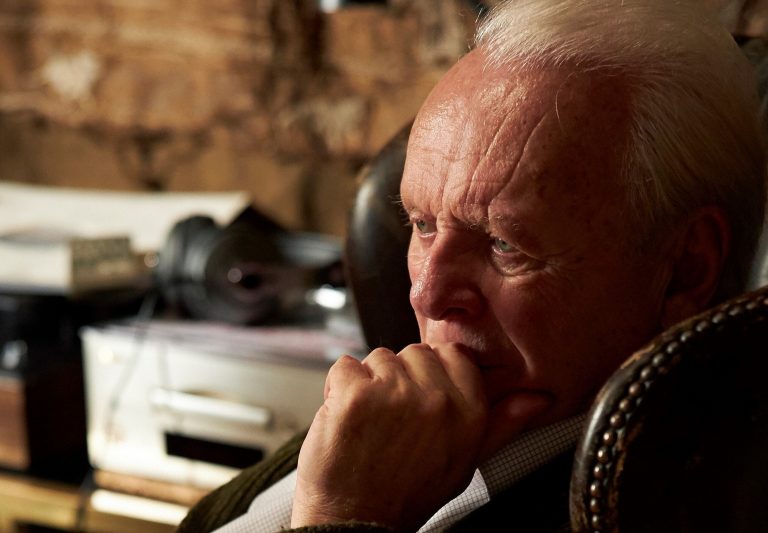
The Father is a 2020 drama film co-written and directed by Florian Zeller, that takes spectators on a delicate journey through the windmills of a human mind, one that is shattering to pieces.
The film marks Zeller’s feature debut, with the adaptation of his 2012 play Le Père — which won in 2014 the Molière Award for Best Play, amongst others, and was considered as “the most acclaimed new play of the last decade.”
The story is as simple as it is gut-wrenching, and its power resides entirely in the mise-en-scène. We are introduced to Anthony, an elderly man, who refuses assistance from his daughter as he ages. We follow his perspective, and the reality he perceives, as he tries to make sense of his changing circumstances.
The music is the first clue we are given to the frail fabric of Anthony’s reality. In his London apartment he is listening to Henry Pucell’s King Arthur, or The British Worthy. The operatic gravitas echoes in the first aria, through the words penned down in John Dryden’s libretto: “What power art thou who from below, Hast made me rise unwillingly and slow, From beds of everlasting snow?” There is an immediate parallelism between the Baroque semi-opera’s Frost Scene and the contemporary older Londoner’s life. The music describes the moment when Cupid awakens the “Cold Genius” (the Spirit of Winter) who, frozen stiff, would prefer to return to his slumber. Meanwhile, we are introduced to Zeller’s Anthony, whose consciousness seems frigidly numbed by his advancing dementia.
The French-British co-production film stars Anthony Hopkins (in the titular role), Olivia Colman (as the daughter), Mark Gatiss, Imogen Poots, Rufus Sewell, and Olivia Williams. The cast is outstanding in maintaining a stifle composure, and enhances the vigour of this motion picture, whose charm is characterised by the way it remains truthful to its theatrical originator. The point of view is entirely that of Anthony. We see inside his head, and we see the world through his subjective perception of it.
Through Anthony’s experience of reality, we understand that what is outside of our consciousness can never be truly separated by our perception of it; and no matter how hard we try, even confronting other people’s perception of the world, it might all come down to a figment of our imagination.
Sir Anthony Hopkins delivers a first-class performance that, so far, has won him his third Best Actor BAFTA for his leading role. The Father also won the BAFTA for Best Adapted Screenplay, that went to Christopher Hampton and Florian Zeller. The film further collected six Academy Awards nominations (Best Picture, Best Actor, Best Supporting Actress, Best Adapted Screenplay, Best Production Design, Best Film Editing), and surely it will bring some Oscar statues home. This marks the sixth Oscar nomination for Anthony Hopkins, including his win for Best Actor in 1992 for Silence of the Lambs.
The Welsh actor is utterly the beating heart of this crossover between theatre, cinema and psychoanalysis, as he conveys his extraordinary Shakespearean expertise into the character of Anthony. Hopkins played King Lear in the 2018 television drama, and the correspondence with Zellar’s protagonist is evident: both characters share a conflictual relationship with their daughter, whose love can longer save them from the deterioration of their psyche.
The labyrinthine intricacy of thought is the unmentioned prime mover of the narrative, as Zellar discloses the flow of the mind with the same elegance and vitality displayed in the literature of Virginia Woolf and James Joyce. The film lyrically portrays how our epiphanies are inseparable from our chores, and the way they are inevitably intermingled with ordinary existence. Zellar renders intensely the way a single day, can become a vivid window into our psychology.
The Father’s stream of consciousness evokes Marcel Proust’s dissection of how time mutates memory. The latter is therefore fallible. Hence, our remembrance of things past is imperfect, even more so through a mind that is being disintegrated by cognitive decline, as the vital impetus withers.
The troubling odyssey about memory loss, shows us the simultaneous destruction of identity. If we are made up of our recollections, losing them entails letting go of who we are. Thus, Sir Anthony Hopkin’s magnificent portrayal of The Father depicts how the self that defines us, emerges from the chaos of consciousness at any given moment, making us realise that we are the whim of feelings we don’t understand and sensations we can’t control.
Here’s the trailer for the film, “The Father.”
Final Grade: A

